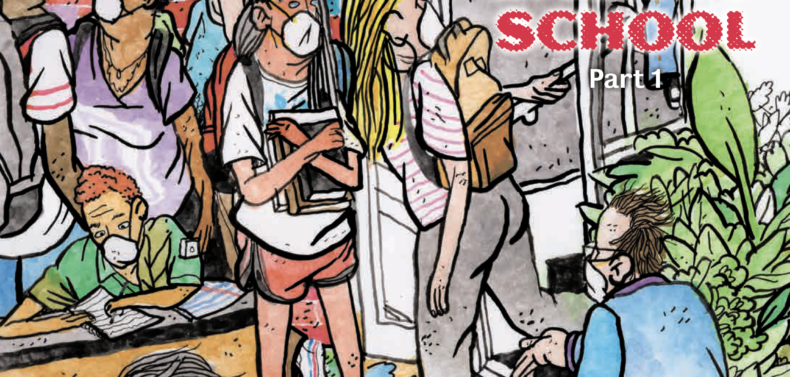Ordinarily, every August Flagpole offers a recap of what happened over the summer for those who are just getting back or are new to town. This year, though, we have to go back to March, when the University of Georgia shut down, and many students rode out the pandemic from their hometowns.
COVID-19 first struck in Wuhan, China in December 2019 and hit the U.S. in January, then Georgia. On Mar. 13, UGA abruptly told students not to come back from spring break and shifted classes online. The next day, the first confirmed case of COVID-19 was reported in Athens. Then the dominoes quickly started falling: The Clarke County School District also went online, festivals and concerts were canceled, and bars and restaurants shut down. Less than a week later, the Athens-Clarke County Commission passed a shelter-in-place ordinance. Life hasn’t been the same since.
April: A whistleblowing nurse reported that 10 of the 12 (now 19) recorded COVID-19 deaths in Clarke County happened at one nursing home, Pruitthealth Grandview. By mid-April, the virus had killed 500 Georgians. Businesses were starting to adapt, though, with many restaurants reopening for carryout and delivery, and other entrepreneurs shifting to making masks and hand sanitizer. Musicians played live shows on Facebook instead of at Flicker.
Even with the economy bolstered by the government grants for small businesses that promised to keep employees on payroll, unemployment spiked 2,000%. By the end of the month, Gov. Brian Kemp had allowed some shuttered businesses—including salons, tattoo parlors and bowling alleys—to reopen. This would prove costly later.
May: With the state projected to lose over $2 billion, thousands of UGA employees stood to lose their jobs or take pay cuts as state lawmakers wrangled over the budget remotely (several legislators had caught COVID, so the session was suspended). Many who’d already lost their jobs were still waiting on their enhanced unemployment benefits. Money did start pouring into local government from the feds, including a $9 million grant for Athens Transit that allowed it to temporarily go fare-free.
The May election, though, was postponed until June—except in one case. Kemp missed a deadline to appoint an interim district attorney to replace Ken Mauldin, who had resigned in February. Under an obscure state law, that meant the Democratic primary for DA would be canceled and the general election pushed back to 2022. Candidate Deborah Gonzalez sued. She would later prevail in federal court, although the ruling is under appeal.
June: The George Floyd protests came to Athens on May 31, when an estimated 1,500–2,000 people gathered downtown to rally for the Black Lives Matter movement. Police responded by declaring a curfew and ordering them to disperse. Around midnight—citing the presence of armed right-wing Boogaloo Boys—police used tear gas and bean-bag rounds against the remaining 100 or so protesters, arresting 19. Witness accounts indicated that the police had gathered bad intelligence, and no one was preparing for violence. It was an unprecedented move by authorities in a city where protests happen on a weekly, if not daily, basis and are unfailingly polite affairs. However, an ACCPD internal review later found that officers acted within department policy. A similarly large protest held the following weekend featured a heavy National Guard presence but ended peacefully.
Mayor Kelly Girtz’s proposed budget included a small cut to the millage rate, but some taxpayers were still incensed that their taxes would be higher because their property values rose in 2019. Spurred on by the protests, commissioners wrangled with last-minute changes to reform police and provide coronavirus relief. Commissioner Mariah Parker put forth a plan to cut police funding in half over 10 years and reinvest the money in housing and social workers. A compromise eventually passed that created a police policy review board and increased funding for public defenders. The commission also set aside over $6 million to help the indigent, nonprofits and small businesses get through the recession. Spurred on by the protests, the commission also agreed to move the Confederate monument away from its prominent location on Broad Street downtown.
The delayed election finally happened on June 9. Four incumbent commissioners—Parker (who was unopposed), Allison Wright, Jerry NeSmith and Mike Hamby—won easily, with Carol Myers winning the open District 8 seat representing the Eastside, and Kirrena Gallagher taking the District 2 seat on the school board representing East Athens.
NeSmith, however, had died in a fall in his home the weekend before the election, though his name remained on the ballot. Citing Georgia law, the Board of Elections—backed by a judge after NeSmith’s widow and other District 6 voters sued—awarded the seat to the challenger, Jesse Houle, rather than call for a special election. A special election will still be held in November, but just to fill the last two months of NeSmith’s term.
July: The University System of Georgia relented to pressure and announced it would start requiring masks on campus. The commission also passed a mask ordinance requiring face coverings inside businesses and other indoor public places, as well as outdoors in situations where social distancing isn’t possible. Kemp would challenge a similar Atlanta ordinance in court, which is still unresolved.
The Board of Education finally reached a settlement with former superintendent Demond Means, who had been on administrative leave since November, when he stated a desire to negotiate his departure. Means received the $409,000 owed to him in his contract, as well as $92,000 in legal fees and $136,000 in damages. Xernona Thomas remains interim superintendent, and no plan to find a permanent replacement has been announced.
CCSD also announced plans to start the school year entirely online, after initially planning to offer parents the option of in-person, virtual or hybrid instruction. The district had already pushed back the start of the school year more than a month, to Sept. 8, to give teachers more time to prepare for distance learning.
As college students started to trickle into town and pack into downtown bars, the pandemic continued to worsen, with cases jumping from 400 to 1,600 in a month. Hoping to tamp down on the maskless masses, the commission voted to cut off alcohol sales at bars and restaurants at 10 p.m. A group of bar owners sued, and as a result, both the earlier last call and the county’s mask ordinance are currently on hold pending an Aug. 14 hearing.
And so here we are.
Like what you just read? Support Flagpole by making a donation today. Every dollar you give helps fund our ongoing mission to provide Athens with quality, independent journalism.










